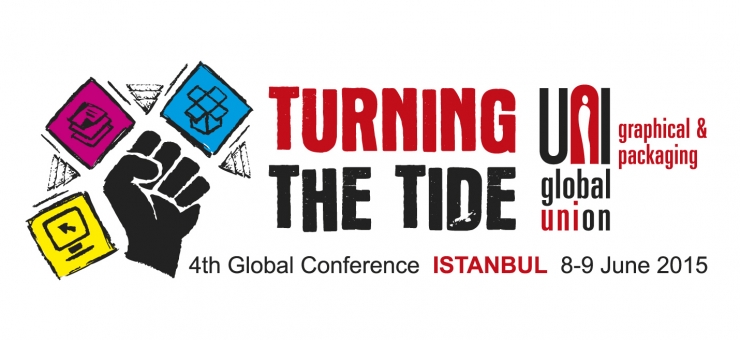News
Turning the Tide at Graphical and Packaging

UNI’s focus on union growth is helping to Turn the Tide in the fast-changing Graphical and Packaging sector remarked Philip Jennings in a keynote address to the 4th UNI Graphical and Packaging world conference in Istanbul.
“We are delighted to see that membership is growing in the sector with the organising work 'on the ground' producing results,” Jennings said.
The conference opened to the news that the Turkish people had voted for significant political change in the country. The Turkish union host Basin-Is observed that this was a victory for democracy, pluralism and those seeking inclusive growth.
“This is a political turning of the tide,” said Basin-Is President Akkaya Yakup. “It is now time for the animosity towards the trade union movement to halt. We have the chance to build a new Turkey of the people.”
In his address Philip Jennings outlined how the global context had evolved, where there were signs of a turning of the tide in economic thinking and the future priorities of UNI Global Union.
Jennings said the big picture was characterized by several megatrends - the economic power shift to Asia and the growing share of emerging markets in world GDP, a world population heading towards 10 billion, the rise in the percentage of the population aged over 65, and rapid urbanisation that means that half of the world’s GDP will be generated in a few hundred cities worldwide.
The global labour market is in constant flux, he said, pointing to a world workforce 3 billion strong but one in which only one in four could say they had decent work. Well over half have no formal contract whatsoever. There are 200 million unemployed - 30 million more since the onset of the financial crisis.
“We are far from winning decentralized work for all, a worker dies every 14 seconds because of unsafe conditions and there are 168 million children at work and over 20 million in forced labour,” Jennings warned. “The economic tide is only lifting some of the boats and we live in the dubious age of growing inequality in wealth and incomes.”
“There is a sense that we are entering the Third Industrial Revolution with technological evolution having a profound impact on jobs and business. The Internet of things, big data, 3D printing, machine learning, and connectivity are creating a new world of work. Some researchers claim 1 in 2 jobs at risk of being replaced by technology.”
“We live also in the age of systemic risk from financial volatility, climate change and health pandemics. The sinews of globalization are now supply chains that represent 80% of the value of world trade and 1 in 5 jobs.”
“A collapse in trust in business is evident. Global union polling with the ITUC shows the overwhelming majority of people do not trust business or the governments they elected to put people needs before those of business.”
“From tax dodging and rising CEO pay the values that the business of business is business meant we lived in the age of irresponsible and unsustainable business conduct. This is the lobby that is fuelling the push for trade agreements from TTIP to the TTP that would do nothing to lift the living standards of workers.”
Was it possible for us to detect any 'turning the tide' in global thinking and action?
“There is frustration that the economic thinking that first brought the financial crisis is unchanging and confirmation, if we needed it, that the trickledown theory was a great economic lie.
“Where are the signs of a turning of the tide? The attention given to growing wealth and income inequality. The consequences on communities, business and general economic wellbeing of a collapsing wage share in overall wealth. The evidence our economies are wage-led. The realisation that precarious work created insecure work, poor wages and was a dead weight on economic vitality. For economies to turn the corner there is a growing emphasis on the creation of quality jobs.”
“The efforts to increase women's participation and the recognition of the need to close the persistent wage gap with men. Research which confirmed that employment legislation was not a barrier to job creation.”
The climate change COP21 summit scheduled for Paris gives the union movement a platform to push for a just transition and that workplace change can only happen with the engagement of workers and their unions. A global refit could create millions of jobs, Jennings said.
The UN September summit on Sustainable Development has already identified 17 goals many of which are aimed directly at the world of work. The ILO has launched a Future of Work Initiative to examine the third industrial revolution. The ILO conference in 2016 will be devoted to the supply chain. The G7 summit was also addressing workers’ rights in supply chains and sought to improve the functioning of the OECD guidelines on multinationals.
The Swedish Prime Minister has launched a new Global Deal push to bring about social inclusion through empowered social dialogue structures. This builds on the Ruggie principles - the UN Guiding Principles on business and human rights which provide a mechanism to change business conduct. UNI has now negotiated over 50 global agreements.
“UNI Global Union is on the move on each of these fronts to push for a turning of the tide,” Jennings concluded. “At the heart of our work is union growth, our knowledge is growing, we know what works, we have new Organising fund resources. We see the proof of that at UNI Graphical and Packaging where there are union growth projects in all regions in many of the key global and local companies.”

